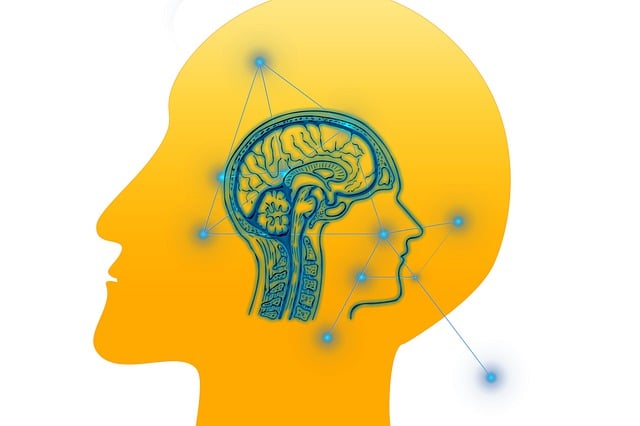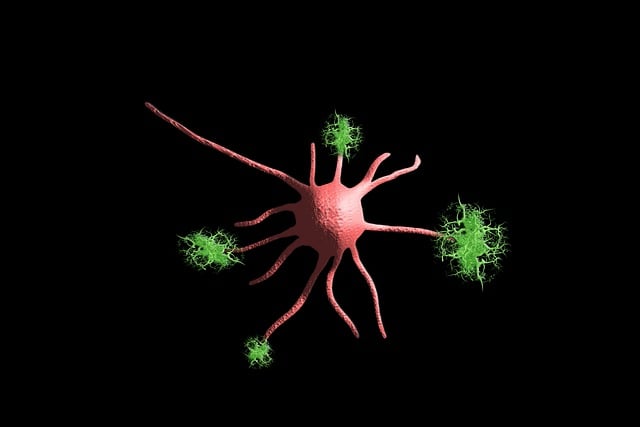The Endocannabinoid System (ECS) is a critical physiological mechanism that regulates appetite, digestion, and overall body homeostasis. Cannabinoids, like those in cannabis, interact with ECS receptors to influence hunger, gastric emptying, and gut motility. Understanding the ECS-cannabinoid interaction holds immense potential for managing obesity, appetite disorders, and gastrointestinal conditions through innovative therapeutic applications. Further research is essential to explore the ECS's role in digestion, weight management, and responsible cannabis use.
Understanding the Endocannabinoid System (ESC) is crucial for unraveling appetite regulation and digestion. This complex network of endogenously produced lipids and receptors plays a pivotal role in maintaining homeostasis within our bodies. In this article, we delve into the intricate dance between cannabinoids and the ESC, exploring their profound effects on appetite and gastrointestinal functions. From the impact of THC to the therapeutic potential of CBD, each cannabinoid navigates unique paths, offering both challenges and promises for digestive health.
The Role of the Endocannabinoid System in Appetite Regulation

The Endocannabinoid System (ECS) plays a pivotal role in regulating appetite and digestion, offering a complex and intricate mechanism that helps balance energy intake and expenditure. This system is comprised of endocannabinoids, receptors, and enzymes that interact to modulate various physiological processes, including food intake, satiety, and the sensation of hunger. By binding to specific receptors in the brain and gut, endocannabinoids can influence neuropeptide secretion, altering eating behaviors and metabolic responses.
Understanding the ECS is crucial as it provides a framework for appreciating the interplay between nutrition, behavior, and overall health. Disruptions in this system have been linked to appetite disorders and metabolic conditions. Thus, targeting the ECS has emerged as a promising therapeutic approach for managing obesity and related diseases, highlighting the significance of ongoing research into its functions and potential applications.
How Cannabinoids Interact with Digestion

The Endocannabinoid System (ECS) plays a pivotal role in regulating various physiological processes, including appetite and digestion. This complex system is comprised of endocannabinoids, receptors, and enzymes that work together to maintain homeostasis within the body. When we consume cannabinoids, such as those found in cannabis, they interact with this intricate network.
Cannabinoids mimic the action of endocannabinoids by binding to CB1 and CB2 receptors located in the digestive system. This interaction can influence hunger cues, stimulate appetite, and modulate gastric emptying. For instance, CBD has been shown to reduce anxiety and pain, which may indirectly affect eating behaviors. Furthermore, cannabinoids’ impact on gut motility and inflammation suggests their potential therapeutic roles in gastrointestinal disorders. Understanding how these compounds interact with the ECS provides valuable insights into both normal digestive processes and the development of innovative treatments for related conditions.
Exploring the Impact of THC on Appetite and Gastrointestinal Functions

The impact of THC on appetite and gastrointestinal functions is an intriguing aspect within the broader understanding of the endocannabinoid system (ECS). The ECS is a complex physiological system that helps regulate various bodily processes, including hunger, digestion, and metabolism. THC, the primary psychoactive compound in cannabis, interacts with this system by binding to specific receptors, particularly CB1 and CB2, which are abundant in the brain and immune cells respectively. This interaction can significantly influence appetite stimulation and gastrointestinal motility. Research suggests that THC may enhance appetite, a phenomenon often observed as “the munchies,” by activating CB1 receptors in areas of the brain associated with food motivation and reward.
Moreover, THC’s effects on digestion extend beyond appetite stimulation. It can slow gastric emptying, potentially aiding in nutrient absorption, and modulate intestinal contractions, influencing both the speed and rhythm of digestion. These actions are attributed to THC’s ability to interact with CB2 receptors in the gastrointestinal tract, leading to a more complex understanding of how cannabis affects digestive health. Understanding these mechanisms is crucial, as it not only provides insights into potential therapeutic applications for conditions affecting appetite and digestion but also highlights the importance of responsible use and further research in this area.
CBD's Influence on Digestive Health and Hunger Signals

The endocannabinoid system (ECS) plays a crucial role in regulating appetite and digestion, two fundamental processes intertwined with our overall health. CBD, or cannabidiol, interacts with this intricate system, offering potential therapeutic benefits. By binding to specific receptors, CBD can influence hunger signals, potentially aiding in weight management and appetite control. This interaction goes beyond mere food cravings; it modulates the gut’s response, impacting digestion and nutrient absorption.
Understanding the ECS is essential here, as it acts as a kind of “master regulator,” keeping various physiological processes in check. CBD’s ability to interact with this system makes it a subject of interest in the field of digestive health. Research suggests that CBD may help alleviate gastrointestinal disorders by reducing inflammation and promoting a balanced response within the ECS, ultimately contributing to improved digestion and a more stable appetite.
Navigating the Effects of Cannabis on Eating Disorders

Cannabis and eating disorders have a complex relationship, with the endocannabinoid system (ECS) playing a pivotal role in this connection. The ECS is a biological system that helps regulate appetite, metabolism, and energy balance by interacting with specific receptors in our bodies. Understanding how cannabis impacts the ECS can shed light on its effects on eating behaviors.
When cannabis is consumed, it binds to endocannabinoid receptors in the brain and other parts of the body, influencing various physiological processes. This interaction can lead to increased appetite, often referred to as “the munchies.” However, for individuals with eating disorders, this effect might be counterproductive or have different outcomes. Some studies suggest that cannabis use can temporarily alter food intake and satiety signals, potentially exacerbating disordered eating patterns. On the other hand, it may also provide a means of self-medication for certain symptoms associated with eating disorders, such as stress and anxiety. Navigating this relationship requires further research to understand the complex interplay between cannabis, the ECS, and eating disorders, ensuring informed and responsible use.
Case Studies: Real-Life Experiences with Cannabis and Digestion

Many real-life experiences highlight the potential impact of cannabis on digestion, offering valuable insights into how understanding the endocannabinoid system (ECS) can aid in managing digestive issues. Studies have shown that cannabis compounds, particularly CBD and THC, interact with the ECS, which plays a crucial role in regulating gut function. For instance, some patients suffering from conditions like irritable bowel syndrome (IBS) report significant relief after incorporating cannabis into their treatment regimen.
These individuals often experience improved digestion, reduced abdominal pain, and better overall gut health. Additionally, cannabis has been found to stimulate appetite, which can be particularly beneficial for those undergoing cancer treatments or other medical conditions causing anorexia. This effect is attributed to the ECS’s involvement in regulating hunger and satiety signals, suggesting that cannabis-based therapies could offer a natural approach to enhancing appetite and supporting digestive well-being.
Scientific Research on Cannabinoids and Their Gastric Benefits

Scientific research has shed light on the fascinating role of cannabinoids in regulating appetite and digestion, offering potential therapeutic benefits for various gastrointestinal disorders. The endocannabinoid system (ECS), a complex signaling network within our bodies, plays a pivotal role in maintaining homeostasis, including digestions processes. This system consists of endocannabinoids (produced naturally by our bodies), receptors (CB1 and CB2), and enzymes that facilitate the production and breakdown of these molecules.
Cannabinoids, such as those found in cannabis, interact with this ECS, influencing various physiological functions, including food intake and digestion. Studies have demonstrated that cannabinoids can modulate gastrointestinal motility, stimulate appetite, and reduce nausea—effects that have significant implications for treating conditions like anorexia, chronic intestinal inflammation, and post-operative nausea. Understanding the intricate relationship between cannabinoids and the ECS provides a foundation for exploring novel treatments and managing digestive health effectively.
Future Perspectives: Potential Therapeutic Applications

The future of appetite and digestion research lies in a deeper understanding of the endocannabinoid system (ECS). This intricate network of receptors, enzymes, and endogenous cannabinoids plays a pivotal role in regulating various physiological processes, including food intake and gastrointestinal function. By unraveling the complex interactions within the ECS, scientists can potentially develop novel therapeutic strategies for treating eating disorders, gastrointestinal diseases, and metabolic conditions.
Targeting the ECS could offer innovative solutions for managing appetite-related issues. For instance, manipulating endocannabinoid signaling may help in controlling overeating and obesity by modulating hunger cues and energy balance. Furthermore, understanding how the ECS influences gut motility and nutrient absorption can lead to advancements in treating gastrointestinal disorders, enhancing drug delivery systems, and improving overall digestive health.
